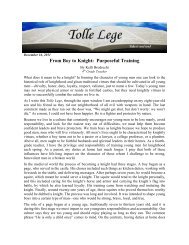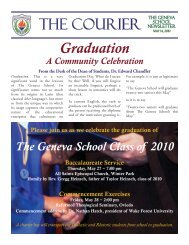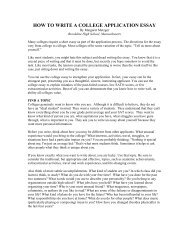and make all moral reasoning possible.Aristotle notes in the Ethics thatthe conscious transfer of this body ofshared assumptions is one of education’sprimary objectives. 5As a quality intentionally cultivated bythe liberal arts curriculum, therefore,we might think of sensus communis asa studied sense of the wisdom and insight(and indeed the prejudices andpresuppositions) of previous generationsthat creates that indefinably familiaratmosphere that settles into thestories, shapes the historical narratives,and inflects the language of a people.It is the development of a conscioussense for what is commonly, thoughimplicitly, held to be true. Commonsense is thus closely related to whatEdmund Burke famously coins “themoral imagination” in his Letter Concerningthe Recent Revolution in France,and sounds remarkably like that distinctlyhuman faculty whose loss C. S.Lewis laments in the first part of <strong>The</strong>Abolition of Man. Philosopher PaulRicoeur also seems to be getting at thissense of the common, when he writeof the insight into life acquired via the“long detour” among the literary andimaginative works of humanity. 6 ForRicoeur, this detour is taken throughthe study of history, literature, poetry,and language. Failure to takethis detour, to run along this path, isto guarantee the short-circuit of selfknowledge.<strong>The</strong> liberal arts cultivate asense for what is held in common byour tradition.Page 6<strong>The</strong> development of taste is, in a numberof ways, the aesthetic analog tothe cultivation of sensus communis. Forto become a musician, a fine artist,an actor, a poet, or a playwright, is totake the long detour via the aestheticachievements of humanity. <strong>The</strong> cellistworks through the instrument’s receivedrepertoire, the fine artist makesmaster copy after master copy, the actorrehearses the lines countless other actorshave performed for generations. I supposewe grasp intuitively the role traditionplays in the pedagogy of the arts.Lest we fail to recognize its significance,however, it is important to see that thespecific claim of the arts in this regardis that creativity and artistic sensibilitiesare formed by attention to tradition. Picasso,to cite but one example, is highlyoriginal (to many of his time shockinglyso); yet, without the tradition of Europeanmasters, there would be no bluepaintings, no Guernica. Again, perhapswe get this intuitively; but how often dowe fail to reflect upon the actual processof artistic formation when we wonderover much that is crass, tasteless, or vulgarin contemporary culture? <strong>The</strong> developmentof aesthetic taste, like the developmentof the adult palate, is formed byexperience. As sensus communis is a studiedsense for the commonly held truthsof a culture, taste is a sense for what isfitting or decent that is cultivated overtime and experienced in the arts.<strong>The</strong> liberal arts—more timelythan timelessTo appreciate fully the contemporaryrelevance of a liberal arts educationand the qualities it cultivates, itis best to place our cultural momentwithin historical perspective. <strong>The</strong> lastcentury witnessed a tectonic shift, asit were, in the cultural and intellectuallife of Western civilization. One istempted to think only of cultural developments—theworld wars, the adventof the nuclear age, or the sexualrevolution—but the intellectual landscapechanged forever as well, mostimportantly in the abandonment ofwhat some intellectual historians havetermed “the Enlightenment project.” 7To paint with very broad strokes, theEnlightenment is an episode in the intellectuallife and culture of Westerncivilization, where on the basis of andin reaction to a number of factors—scientific, social, religious, and political—Westernthinkers experiencedan acute loss of confidence in centralelements of human tradition and inthe institutions that embodied andperpetuated that tradition. WhereasWestern civilization had been maintainedby a tensed harmony (at leastin theory) of a number of incommensurableauthorities—faith, tradition,reason, experience, community—theEnlightenment project is perhaps bestcharacterized as the attempt to securethe goods of that tradition upon morecertain grounds. A brilliant illustrationof this project is Immanuel Kant’s1784 essay An Answer to the Question:What is Enlightenment?, where he famouslydescribes enlightenment asman’s emergence from self-imposedimmaturity, an immaturity strictly definedas reliance upon such traditionalmediating structures and institutionsas books, doctors, priests, and judgesin human intellectual, physical, religious,and moral life. To be enlightened,claims Kant, is to dare to thinkfor oneself—sapere aude! (dare to bewise)—and thus his ideal human isa rationally autonomous subject forwhom reason is the sole guarantor ofhuman intellectual and moral goods.By mid-twentieth century, when therealization that the European Enlightenmenthad culminated in the mostdevastating (and efficient) eliminationof human life the world has yetwitnessed—indeed greater in quantitythan all armed conflicts in human historycombined—recognition of theEnlightenment project’s failure waswidespread. Yet, it was not merely malaiseor disillusionment that signaledthe end of enlightenment; throughoutthe twentieth century there was also asuccession of insights—notably fromthe sciences—concerning the role historicaltradition and community practicesplay in forming our philosophicaloutlook, the influence that religious (oranti-religious) presuppositions have inour reasoning, and the comprehensiveeffect that language and culture have inshaping our understanding of ourselvesand the world in which we live. Withthis succession of insights has come renewedappreciation for the displacednotions of faith, tradition, reason, experience,and community, and thus
the practices and ways of being in theworld that gave them plausibility priorto the enlightenment. Interestingly, itis this transition from enlightenmentto a new way of thinking about humanrationality that provides a renewedcontext for liberal arts education, andI think the most compelling case forits contemporary re-appropriation. Forthe historical, aesthetic, and philologicaldisciplines of the liberal arts curriculumare especially well fitted to themore robust understanding of what itmeans to be rational in our current intellectualsituation.Thinking beyond the “wellrounded”studentWe are now in the position to addressthe problem with the commonplacenotion of the “well-rounded person” Imentioned above. For it was preciselyin unquestioning response to Enlightenmentrationality that the liberalarts were first defended as the meansof making well-rounded persons. <strong>The</strong>rational and scientific disciplines, sothe thinking went at the time, set thestandards for what it means to be welleducated; the liberal arts simply makeone refined, cultured, humane. Thustaste, common sense, and judgmentwere understood to be important subjectiveor intuitive qualities for oneto develop while otherwise acquiringobjective and scientific knowledge.However laudable the intention, thisnotion is tragically mistaken for atleast two important reasons. In thefirst place, rather than maintainingthe liberal arts in something of a separatebut equal status with the sciences,emphasizing their cultural or refiningqualities actually served to relegatethe liberal arts to window-dressing.In the age of science, urbanization,and industrialization, such accoutrementwas superfluous—indeed, whenit comes to making the automobile,not only history, but art and literatureas well, are bunk. When we consideralso the spread of the democratic ideal,the very notion of refinement smacksof elitism and old-world aristocracy.Moreover, in light of the discussionabove, it ought to be clear that therelegation of the liberal arts to the peripheryof the curriculum was philosophicallynaive. It was not apparentin the nineteenth century, but we seenow that the qualities the liberal artscultivate, much more than roundingout a practical scientific education, actuallyplay a fundamental role in theacquisition of human understandingas such. <strong>The</strong> liberal arts are thus essentialto and not just an accidental elementof education.It was not apparent in the nineteenthcentury, but we see nowthat the qualities the liberalarts cultivate, much more thanrounding out a practical scientificeducation, actually play afundamental role in the acquisitionof human understandingas such. <strong>The</strong> liberal arts are thusessential to and not just an accidentalelement of education.I alluded earlier to C. S. Lewis’s <strong>The</strong>Abolition of Man, and I will concludeby reflecting on the closing words ofthe first essay in that work where hewrites: “And all the time—such is thetragi-comedy of our situation—wecontinue to clamour for those veryqualities we are rendering impossible.You can hardly open a periodical withoutcoming across the statement thatwhat our civilization needs is more‘drive,’ or dynamism, or self-sacrifice,or ‘creativity.’ In a sort of ghastly simplicitywe remove the organ and demandthe function.” He is lamentingthe failure of modern education tocultivate the very qualities we have addressedall too briefly in this essay—moral judgment, sensus communis, andtaste. As the reader will recall, moderneducation has often rendered thesequalities impossible because it has displacedthe liberal arts curriculum withwhat is imagined to be a more practicalor more relevant curriculum. Chestertononce remarked that thoroughlyworldly people never understand eventhe world. Perhaps we should say inconclusion that thoroughly practicalpeople are never truly practical. Forit is precisely the impractical detouramong the literary and imaginativeworks of humanity that cultivates thequalities that lead to meaningful humanaction. Liberal arts education setsthis detour as its curriculum, that is, asthe course to be run.1. In enumerating these qualities inparticular, I follow Jean Grondin inhis Sources of Hermeneutics (SUNY,1995).2. For a discussion of phronesis, seeAristotle’s Nicomachean Ethics, book 63. Aristotle famously comments:“Hence the young man is not a fit studentof Moral Philosophy, for he hasno experience in the actions of life,while all that is said presupposes andis concerned with these”(NicomacheanEthics, Book 1)4. Here I discuss its technical meaningfrom the field of rhetoric, which is discussedby both Plato and Aristotle (thelatter treats it extensively in both hisRhetoric and Topics). Common sensealso refers to the ancient psychologicalnotion that human beings possessa mental faculty that unifies the fivesenses into a single experience.5. Lewis notes this in <strong>The</strong> Abolition ofMan, showing that Aristotle sharesthis assumption of the role of educationwith a number of other thinkersfrom antiquity to the present.6. Paul Ricoeur, <strong>The</strong> Symbolism of Evil.Trans. and ed. Emerson Buchanan.Boston: Beacon Press,1969.7. See especially: Alasdair MacIntyre,After Virtue, 3rd edition (Notre Dame,2007).Page 7






